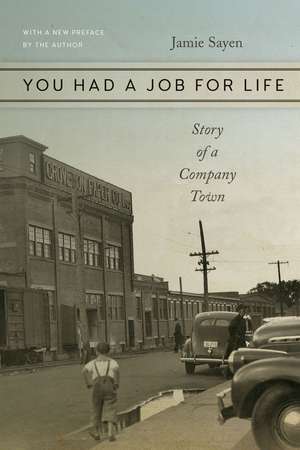You Had a Job for Life – Story of a Company Town
Autor Jamie Sayenen Limba Engleză Paperback – 4 noi 2023
Absentee owners. Single-minded concern for the bottom line. Friction between workers and management. Hostile takeovers at the hands of avaricious and unaccountable multinational interests. The story of America’s industrial decline is all too familiar—and yet, somehow, still hard to fathom. Jamie Sayen spent years interviewing residents of Groveton, New Hampshire, about the century-long saga of their company town. The community’s paper mill had been its economic engine since the early twentieth century. Purchased and revived by local owners in the postwar decades, the mill merged with Diamond International in 1968. It fell victim to Anglo-French financier James Goldsmith’s hostile takeover in 1982, then suffered through a series of owners with no roots in the community until its eventual demise in 2007. Drawing on conversations with scores of former mill workers, Sayen reconstructs the mill’s human history: the smells of pulp and wood, the injuries and deaths, the struggles of women for equal pay and fair treatment, and the devastating impact of global capitalism on a small New England town. This is a heartbreaking story of the decimation of industrial America.
Preț: 165.24 lei
Nou
Puncte Express: 248
Preț estimativ în valută:
31.62€ • 33.44$ • 26.38£
31.62€ • 33.44$ • 26.38£
Carte disponibilă
Livrare economică 09-23 decembrie
Preluare comenzi: 021 569.72.76
Specificații
ISBN-13: 9781684581849
ISBN-10: 1684581842
Pagini: 304
Ilustrații: 24 halftones
Dimensiuni: 154 x 227 x 23 mm
Greutate: 0.45 kg
Editura: Brandeis University Press
ISBN-10: 1684581842
Pagini: 304
Ilustrații: 24 halftones
Dimensiuni: 154 x 227 x 23 mm
Greutate: 0.45 kg
Editura: Brandeis University Press
Notă biografică
Jamie Sayen is a writer and environmental activist living in New Hampshire. He is the author of Einstein in America: The Scientist’s Conscience in the Age of Hitler and Hiroshima. His new book, Children of the New Forest, will be published this fall.
Cuprins
Introduction: Builders and Destroyers
Chapter One: The Life Of The Town
Chapter Two: Feeding The Mill
Chapter Three: Making Paper
Chapter Four: Prosperous Plant
Chapter Five: Ratville, NH
Chapter Six: Three Generations of Wemysses
Chapter Seven: Crown Prince
Chapter Eight: The Perfect Balance
Chapter Nine: The Dark Side
Chapter Ten: A Fateful Decision
Chapter Eleven: End of An Era
Chapter Twelve: The Worst Years
Chapter Thirteen: The Best Years
Chapter Fourteen: A Battle We Couldn’t Win
Chapter Fifteen: Controllables and Uncontrollables
Chapter Sixteen: F This
Epilogue: They Ruined This Town
Postscript: The Day When Corporate America Doesn’t Run Us
Acknowledgments
Notes
Index
Chapter One: The Life Of The Town
Chapter Two: Feeding The Mill
Chapter Three: Making Paper
Chapter Four: Prosperous Plant
Chapter Five: Ratville, NH
Chapter Six: Three Generations of Wemysses
Chapter Seven: Crown Prince
Chapter Eight: The Perfect Balance
Chapter Nine: The Dark Side
Chapter Ten: A Fateful Decision
Chapter Eleven: End of An Era
Chapter Twelve: The Worst Years
Chapter Thirteen: The Best Years
Chapter Fourteen: A Battle We Couldn’t Win
Chapter Fifteen: Controllables and Uncontrollables
Chapter Sixteen: F This
Epilogue: They Ruined This Town
Postscript: The Day When Corporate America Doesn’t Run Us
Acknowledgments
Notes
Index
Recenzii
“[A] heartbreaking history.”
“Through this remarkably engaging oral history and its many colorful stories of characters, pranks, and conflicts, the reader comes to know the people whose lives were dominated by the mill, and the devastating impact upon them and the town when the mill ceased to operate.”
“It includes labor disputes and the women's struggle for equal pay, the financial machinations that passed ownership through multiple hands over its century in operation, and the bare hands of workers building it all from the ground up. It is all so vivid you can almost smell the sulfur on their skins.”
“This remarkable account made me think of Studs Terkel and his classic oral histories—but it also made me think of all the blather about working-class communities in the wake of the Trump election. Sayen has replaced the blather with fact, and it’s a powerful portrait.”
“Sayen captures brilliantly how the closing of paper mills impacted not just jobs, but people’s sense of community, of hope, and of belief in the American dream. He offers also a path forward for economic revitalization. This is a must-read for anyone who wants to understand what happened in many rural and factory towns and what we should do about it as a nation.”
